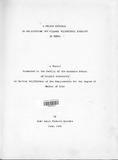A design approach to facilitating the village polytechnic ideology in Kenya

View/
Date
1985-06Author
Mwendwa, Suki Kaloo kathuka
Type
ThesisLanguage
enMetadata
Show full item recordAbstract
The Village Polytechnic Programme (VPP) in Kenya, one of
the non-formal educational programmes designed to solve problems
of illiteracy, unemployment, and rural development, has been
in existe,,nce since 1966. The programme's focus is on
primary school leavers (graduates) who were unable to pursue
a higher education and had ,no skills to sustain themselves.
The basis of the ideology of the programme is self-reliance.
Self reliance is achieved,through the trainees' developing
skills which are useful and applicable to their communities.
Skills required for the development of one community may
differ from those required by another. To encourage local
development, the VPP has to be flexible and adaptable to
local situations.
The potential of the Village Polytechnic (VP) ideology
has not been fully realised. Part of the problem is in how
VPs are perceived. The tendency is for communities to view
the VP as a school for formal education. The misconception ,
of the VP as a formal school interferes with the ideology's
objectives.
It is suggested in this study that the misconception of
the VP is due in part to the inability of the VP to present
an image consistent with its own ideology and objectives.
This misconception of the VP may be partly resolved through
the facility and its design considered here in the broad
sense, with emphasis placed on who the design is made for as
well as on how the facility is designed. Conventional
architectural design and planning involves one person making
all decisions regarding a design. This design approach is
not workable with VPs, as their philosophy of self reliance
is to allow for wide participation by members of the
society. Therefore, designing for the VPP requires a style
and approach that complement the development of the VP.
This study employs anthropological, cultural, and
historical concepts to develop an appropriate design for the
VP. Alexander's Pattern Language concept is used to develop
criteria which relate the VP ideology, the programme, and the
facility. These criteria are illustrated hypothetically by
applying them to a Village PolyteChnic in Ukambani, a region
in Kenya.
The design approach described in this study is yet to be
tested in an actual rural community within Kenya. It appears
to be an approach which will result in more appropriate
facilities hopefully enabling the VPP to achieve its ideals
and Objectives within each community.
Publisher
Faculty of the Graduate School of Cornell University
Description
Master of Arts
